2020 官网升级中!现在您访问官网的浏览器设备分辨率宽度低于1280px请使用高分辨率宽度访问。
Drill bit is composed of two parts: a skirt body and a carbide button. The skirt body and the rock drill rod are connected by threads and driven by the rock drill, and the carbide button drills and breaks the rock. Therefore, the rock drill bit is the part that suffers the most shock and wears in the entire system.
Classification by thread type:
There are mainly two types of R-thread and T-thread.
R-thread specifications are R25, R28, R32, R38, etc. The basic dimensions and button profile of the R-thread mainly refer to the industry standard ISO10208.
T-threads specifications are T38, T45, T51, etc. The basic dimensions and button profile of T-threads mainly refer to the corporate standards of each company, but the dimensions and button profile of each company are almost the same. Therefore, the drill bits have high interchangeability in the industry.
Classification by shape and structure:
There are mainly chisel, cross, X shape, button, and other types.
The button shape is the most commonly used structure for threaded bits, so it is divided into an ordinary flat face, retrac flat face, reaming semi-dome, reaming guide, ordinary drop center, and retrac drop center, etc.
| Bit face | Application | Rock consolidation | Drilling speed |
|---|---|---|---|
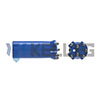 |
For use in all rock conditions, especially for harsh or abrasive conditions such as granite, basalt, and hard limestone | much | slow |
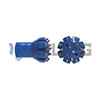 |
Drill straighter holes in less consolidated rock | middle | middle |
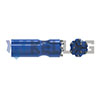 |
For soft rock, such as low-silica shale and limestone | less | fast |
4 types of drill bits: chisel bits, cross bits, X bits, button bits;

Diameter of drill bit:
chisel bits: 32mm-42mm; cross bits: 34mm-65mm;
X bits: 55mm-65mm; button bits: 38mm-150mm.
| Type | Specification | Bit Dia. | Button NO. × Button Size (mm) | Gauge Tooth Angle | Thread Type | Weight | |||
|---|---|---|---|---|---|---|---|---|---|
| mm | inch | Gauge | Front | kg | |||||
| Button bit | K16343-0502-1313 | 43 | 1 11/16″ | 5×10 | 2×9 | 30° | R32 | 0.60 | |
| K16345-0502-1313 | 45 | 1 3/4″ | 5×11 | 2×9 | 30° | R32 | 0.70 | ||
| K16348-0502-1315 | 48 | 1 7/8″ | 5×11 | 2×9 | 35° | R32 | 0.80 | ||
| K16351-0502-1315 | 51 | 2″ | 5×11 | 2×10 | 35° | R32 | 1.20 | ||
| K16345-0502-1333 | 45 | 1 3/4″ | 5×11 | 2×9 | 30° | R32 | 0.70 | ||
| K16348-0502-1335 | 48 | 1 7/8″ | 5×11 | 2×9 | 35° | R32 | 0.80 | ||
| K16351-0502-1335 | 51 | 2″ | 5×11 | 2×10 | 35° | R32 | 1.20 | ||
| K16345-0602-1315 | 45 | 1 3/4″ | 6×10 | 2×9 | 35° | R32 | 0.70 | ||
| K16348-0602-1314 | 48 | 1 7/8″ | 6×10 | 2×9 | 40° | R32 | 0.80 | ||
| K16351-0602-1314 | 51 | 2″ | 6×11 | 2×10 | 40° | R32 | 1.20 | ||
| K16343-0603-1313 | 43 | 1 11/16″ | 6×10 | 3×8 | 30° | R32 | 0.60 | ||
| K16345-0603-1313 | 45 | 1 3/4″ | 6×10 | 3×9 | 30° | R32 | 0.70 | ||
| K16348-0603-1315 | 48 | 1 7/8″ | 6×10 | 3×9 | 35° | R32 | 0.80 | ||
| K16351-0603-1315 | 51 | 2″ | 6×11 | 3×9 | 35° | R32 | 1.00 | ||
| K16348-0603-1333 | 48 | 1 7/8″ | 6×10 | 3×9 | 30° | R32 | 0.80 | ||
| K16351-0603-1335 | 51 | 2″ | 6×10 | 3×9 | 35° | R32 | 1.00 | ||
The above specifications mainly take the button bit used for the R32 heavy drill rod as an example.
For more product specifications, Please email us at info.k@kellegco.com or leave us a message, Kelleg will provide you with professional and promt reply.
1. What is the classification of the carbide button?
| Carbide button | Product | Advantages | Application |
|---|---|---|---|
| Conical Button | 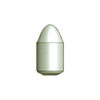 |
High drilling efficiency | medium-hard rock such as limestone, gravel, marble, pyrite, etc. from f8 to f14. |
| Parabolic Button | 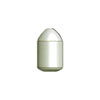 |
The button feeding speed is fast, which can not only ensure a certain rock drilling efficiency but also have a better service life. | medium hard rock moderately corrosive rock formations |
| Ogive Button | 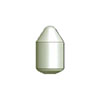 |
Fast button feed speed and excellent rock drilling efficiency | soft rock such as shale, clay rock, sandstone, and rock salt below f8 |
2. The shape of the head of the drill bit is divided into flat face、drop center and semi-dome. Which one is better?
Due to the flat shape, efficiency of flat drill bit is relatively high during the drilling process;
The drop center/semi-dome drill bit has a drop center/ semi-dome in the middle of the drill bit. During the drilling process, the center plays a fixed role, so it can be drilled into a straight line.
Therefore, we cannot directly judge which effect is better. We need to combine different geological and construction conditions and analyze the specific problems. If the orientation needs to be kept vertical, it is recommended to use a drop center/ semi-dome drill bit.
3. Which two indicators should we pay attention to when using drill bit?
Drilling speed and service life.
The drilling speed and service life directly affect the operation efficiency and economic benefits of the enterprise, so they are also the two most concerning indicators. During the construction of the project, a suitable drill bit must be selected according to the geological conditions.
4. What are the factors that affect the life of the drill bit?
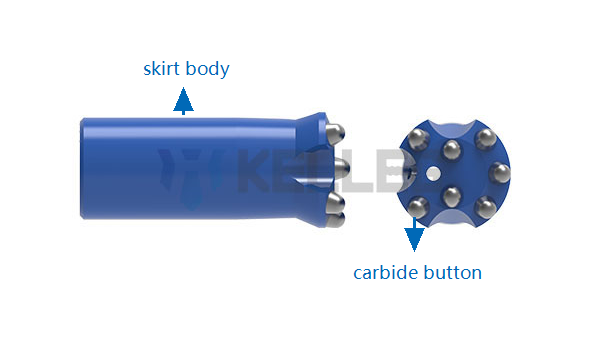
Carbide button, skirt body.
Since the wear resistance of carbide buttons produced by different manufacturers is different, it is one of the factors affecting the drill bit service life.
The drill bit material generally refers to the skirt body material, so the skirt body service life directly affects the drill bit service life. The factors affecting the skirt body service life are skirt body material (42CrMo, 45CrNiMo1V), processing technology, operation methods, and geological conditions.
5. What are the factors that affect the drilling efficiency of the drill bit?
Carbide button, arrangement of buttons, powder discharge, and slag discharge.
Carbide button: Since the drill bit carbide button shape is different, its drilling efficiency is also different. For example, the ogive button has the fastest drilling speed.
Arrangement of buttons: Drill bit carbide button is composed of angled gauge and front button, which are mainly related to the number and angle of the arrangement of buttons.
Powder discharge and slag discharge: In the process of drilling, there will be a lot of dust and waste slag. If the waste slag cannot be removed in time, it will become harder and harder under the impact of the force, directly affecting the drilling efficiency.
6. What is the function of water passing when the threaded bit is working?
Cooling, slag discharge, dust removal.
The threaded bit generates a high temperature during work. If there is no water through, the high temperature easily causes the bit to be damaged. The water plays a role in cooling. At the same time, the threaded bit produces a lot of dregs and dust during work, which is affect the drilling efficiency. The water can remove the dregs and play a role in dust removal.